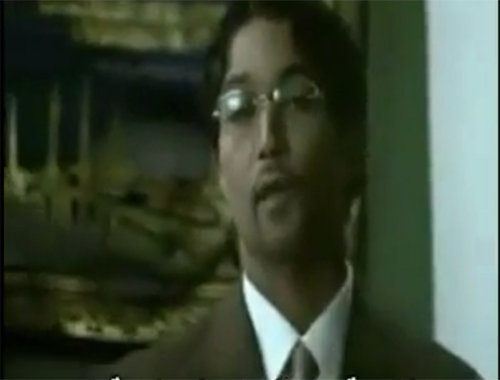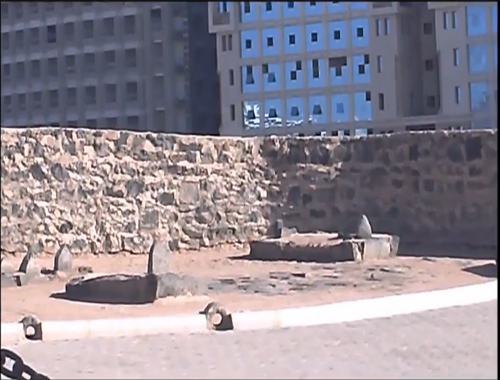Words of Guidance from Imam Reza (AS)
- Details
- Hits: 13500
.jpg)
Words of Guidance from Imam Reza (AS)
"If the caliphate is your right then it is not rightful for you to relinquish it and pass it on to anyone else. And if it is not your right then how can you give to others something which does not belong to you!"
This is how Imam Ali ibn Musa ar-Reza (AS) replied to Ma’moun when the crafty Abbasid caliph thought of a ruse to make a display of his questionable claim to authority over the Muslims and to try to trap him in the tantalizing bait of temporal power.
The 8th infallible heir of Prophet Muhammad (p.b.u.h) thus deftly unmasked an elaborately hatched plot of the forces of oppression who had usurped the temporal rights of the divinely-designated Imams.
Of course, the issue of Wilayat al-Mutlaqa was not at stake. No one could infringe upon that trust which had been given by Almighty Allah to Adam at the dawn of creation and which Prophet Muhammad (SAWA) by divine commandment had passed on to Imam Ali ibn Abi Talib (AS) at Ghadeer after the farewell pilgrimage.
It was now vested in the person of Imam Reza (AS), and not even in their wildest dreams Ma’moun and his ilk could ever think of infringing upon it. Imamate was beyond the power of erring mortals, as God says in the Holy Qur'an after appointing Abraham as the Imam of mankind: "My covenant will not reach the unjust." (2:124)
It was because of this frustration that the divinely-designated Imams of the Prophet's blessed Household had been subjected to various forms of oppression by the unjust caliphs. The form of oppression chosen by Ma’moun for Imam Reza (AS) was being disguised in the paraphernalia of statecraft.
More than half a century had passed since a popular movement in Khorasan in favor of the Ahl-ul-Bayt had been hijacked by the Abbasids. Although they had usurped the temporal rights of Imam Ja'far as-Sadiq (AS), they had failed in discrediting his popular appeal and that of his son and successor Imam Musa al-Kadhim (AS), among the Muslim masses.
Mansour and Haroun ar-Rashid had respectively poisoned the 6th and 7th infallible Imams, but their most gruesome acts of cruelty had been unable to drive a wedge between the Ummah and the Ahl-ul-Bayt. People's sentiments continued to beat high for the Prophet's heirs despite the opening up of state coffers to buy legitimacy for the Abbasids.
Thus, it was for this reason that Imam Ali ibn Musa ar-Reza (AS) happened to be in Merv in Khurasan that day in the year 201 AH, faraway from his hometown Madinah. Ma’moun had forced him to come to his capital in Khurasan in the vain hope of tarnishing the image of Imamate through the offer of abdication of the caliphate in his favor.
It was a plot to deceive public opinion. But the 8th Imam saw through the ruse and gave the answer which I have quoted at the beginning of the article. Officialdom was appalled, but the diplomat that Ma’moun was, forced on the Imam the ceremonial post of the heir-apparent by way of veiled threats.
Coins were immediately struck in the name of Imam Reza (AS). The black state colors of the Abbasids were replaced with the green of the Bani Hashim. Poets were made to sing praises and gifts were distributed. The real intention, however, was to isolate the Imam from the Ummah by keeping him virtually confined in the caliph palace, not only to extinguish the light of guidance but to make the people disillusioned with the Prophet's heir, who would now be viewed as a willing accomplice of the Abbasids.
But Divine Providence had other plans, an indication of which had been given by Imam Reza (AS) in Nayshabour before his arrival in Merv, when some 24,000 scribes surrounded his canopied camel requesting a hadith from Prophet Muhammad (SAWA). The Imam quoted on the chain of authority of his illustrious forefathers from the Prophet that the testimony of the Almighty Allah's indivisible unity (Tawhid) is a haven of bliss, and whoever enters it, is safe from divine wrath.
But, added the 8th Imam, as his camel began to rise: "It has certain conditions and stipulations and I am one of those conditions."
Imam Reza (AS) thus spelled out the terms of faith which are inextricably bound to Wilaya of the Ahl-ul-Bayt, so vital for the journey of the soul in the Hereafter. His popularity soared, and no matter how articulate Ma’moun could be in trying to keep the 8th Imam out of reach of the people, at the least exposure to the public, as happened at the famous event of the Eid al-Fitr prayer at the Jame' Mosque of Merv, the caliphate appeared ready to fall apart whenever Imamate strode on the scene.
Ma’moun had utterly failed. He could no longer hide his wicked inner feelings. The curtain was coming full force on the drama he had orchestrated. Therefore, he conspired to poison Imam Reza (AS), and after carrying out the foul deed, the Abbasid actor again tried to dupe the shocked people by attiring himself in black and marching with the funeral in a feigned state of grief.
The burial given was official, but it did not delay the Abbasid fall into oblivion. Those still in doubt should take a look at Mashhad in Khurasan, Northeastern Iran. The land has no vestiges of Haroun ar-Rashid and Ma’moun, while the person who pronounced the Hadith of the Golden Chain (Silsilat-udh-Dhahab) in Nayshabour, continues to exercise his rightful authority over Muslim hearts. Pilgrims to the shrine of the 8th Imam, salute the Ahl-ul-Bayt and heap curses on Haroun and Ma’moun.
The 8th infallible heir of Prophet Muhammad (p.b.u.h) thus deftly unmasked an elaborately hatched plot of the forces of oppression who had usurped the temporal rights of the divinely-designated Imams.
Of course, the issue of Wilayat al-Mutlaqa was not at stake. No one could infringe upon that trust which had been given by Almighty Allah to Adam at the dawn of creation and which Prophet Muhammad (SAWA) by divine commandment had passed on to Imam Ali ibn Abi Talib (AS) at Ghadeer after the farewell pilgrimage.
It was now vested in the person of Imam Reza (AS), and not even in their wildest dreams Ma’moun and his ilk could ever think of infringing upon it. Imamate was beyond the power of erring mortals, as God says in the Holy Qur'an after appointing Abraham as the Imam of mankind: "My covenant will not reach the unjust." (2:124)
It was because of this frustration that the divinely-designated Imams of the Prophet's blessed Household had been subjected to various forms of oppression by the unjust caliphs. The form of oppression chosen by Ma’moun for Imam Reza (AS) was being disguised in the paraphernalia of statecraft.
More than half a century had passed since a popular movement in Khorasan in favor of the Ahl-ul-Bayt had been hijacked by the Abbasids. Although they had usurped the temporal rights of Imam Ja'far as-Sadiq (AS), they had failed in discrediting his popular appeal and that of his son and successor Imam Musa al-Kadhim (AS), among the Muslim masses.
Mansour and Haroun ar-Rashid had respectively poisoned the 6th and 7th infallible Imams, but their most gruesome acts of cruelty had been unable to drive a wedge between the Ummah and the Ahl-ul-Bayt. People's sentiments continued to beat high for the Prophet's heirs despite the opening up of state coffers to buy legitimacy for the Abbasids.
Thus, it was for this reason that Imam Ali ibn Musa ar-Reza (AS) happened to be in Merv in Khurasan that day in the year 201 AH, faraway from his hometown Madinah. Ma’moun had forced him to come to his capital in Khurasan in the vain hope of tarnishing the image of Imamate through the offer of abdication of the caliphate in his favor.
It was a plot to deceive public opinion. But the 8th Imam saw through the ruse and gave the answer which I have quoted at the beginning of the article. Officialdom was appalled, but the diplomat that Ma’moun was, forced on the Imam the ceremonial post of the heir-apparent by way of veiled threats.
Coins were immediately struck in the name of Imam Reza (AS). The black state colors of the Abbasids were replaced with the green of the Bani Hashim. Poets were made to sing praises and gifts were distributed. The real intention, however, was to isolate the Imam from the Ummah by keeping him virtually confined in the caliph palace, not only to extinguish the light of guidance but to make the people disillusioned with the Prophet's heir, who would now be viewed as a willing accomplice of the Abbasids.
But Divine Providence had other plans, an indication of which had been given by Imam Reza (AS) in Nayshabour before his arrival in Merv, when some 24,000 scribes surrounded his canopied camel requesting a hadith from Prophet Muhammad (SAWA). The Imam quoted on the chain of authority of his illustrious forefathers from the Prophet that the testimony of the Almighty Allah's indivisible unity (Tawhid) is a haven of bliss, and whoever enters it, is safe from divine wrath.
But, added the 8th Imam, as his camel began to rise: "It has certain conditions and stipulations and I am one of those conditions."
Imam Reza (AS) thus spelled out the terms of faith which are inextricably bound to Wilaya of the Ahl-ul-Bayt, so vital for the journey of the soul in the Hereafter. His popularity soared, and no matter how articulate Ma’moun could be in trying to keep the 8th Imam out of reach of the people, at the least exposure to the public, as happened at the famous event of the Eid al-Fitr prayer at the Jame' Mosque of Merv, the caliphate appeared ready to fall apart whenever Imamate strode on the scene.
Ma’moun had utterly failed. He could no longer hide his wicked inner feelings. The curtain was coming full force on the drama he had orchestrated. Therefore, he conspired to poison Imam Reza (AS), and after carrying out the foul deed, the Abbasid actor again tried to dupe the shocked people by attiring himself in black and marching with the funeral in a feigned state of grief.
The burial given was official, but it did not delay the Abbasid fall into oblivion. Those still in doubt should take a look at Mashhad in Khurasan, Northeastern Iran. The land has no vestiges of Haroun ar-Rashid and Ma’moun, while the person who pronounced the Hadith of the Golden Chain (Silsilat-udh-Dhahab) in Nayshabour, continues to exercise his rightful authority over Muslim hearts. Pilgrims to the shrine of the 8th Imam, salute the Ahl-ul-Bayt and heap curses on Haroun and Ma’moun.











